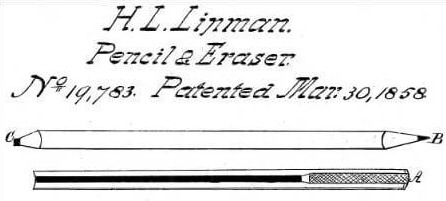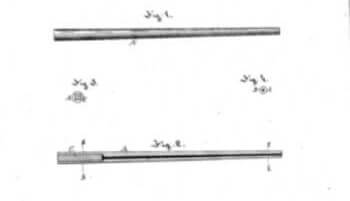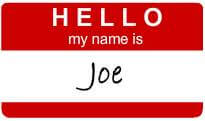March 30 is Pencil Day

Today is Pencil Day but it is not, as the name might imply, the date of its invention. On March 30, 1858, Hymen Lipman patented his addition of an eraser to an existing design.
*****
Fun Fact: The first known usage of the word “pencil” occurred in the 14th century, derived from Old French pincel, meaning “artist’s paintbrush.” Pincel traces back to Latin penicillus, “little tail,” a diminutive of peniculus, “brush” and penis, “tail.” Every time you write a grocery list or fill in a crossword puzzle, you’re holding a piece of history named for an ancient joke about penis size.
*****
Lipman designed his pencil with a rubber eraser embedded inside the wood at one end to enable a writer to sharpen the pencil’s graphite or eraser as needed. He described the process in his patent application:
I make a lead-pencil in the usual manner, reserving about one-fourth of the length, in which I make a groove of suitable size, A,and insert in this groove a piece of prepared india-rubber…The pencil is then finished in the usual manner, so that on cutting one end thereof you have the lead B, and on cutting at the other end you expose a small piece of india-rubber, C, ready for use, and particularly valuable for removing or erasing lines, figures, &c., and not subject to be soiled or mislaid on the table or desk.

The patent was granted and in 1862, Lipman sold it to Joseph Reckendorfer for $100,000, the equivalent of $2.3 million today. Later that year, Reckendorfer applied for and was granted a patent for his “improvement,” which made the pencil tapered like a chopstick.

A few years later, Reckendorfer sued German company Faber (which would become Faber-Castell in 1900) for selling a similar pencil. The case was ultimately decided by the U.S. Supreme Court, which ruled an article constructed of two preexisting things could not be patented unless it produced “a different force or effect or result in the combined forces or processes from that given by their separate parts.”
The example of a hoe attached to a rake’s handle was used to illustrate that whether or not the combined item was more convenient than either of its constituent parts, it did not qualify as an invention in its own right. Lipman didn’t claim to have invented the idea and his repeated use of the phrase “in the usual manner” didn’t help matters. In 1875, the court ruled against Reckendorfer and declared his patents invalid. Today, Faber-Castell is the world’s oldest running pencil manufacturer.
*****
Fun Fact: Pencils are filled with graphite, but our habit of calling it lead reaches back to the early 16th century. An enormous deposit of graphite was unearthed in England, misidentified as lead due to its similar appearance and used for pencils, among other things. At the time, it was named plumbago, meaning “lead ore,” which also happens to share its root with the word plumber, “person who works with lead.”
*****
Have a happy Pencil Day!
![]()



 Today is National Joe Day. We have been unable to track down the source of this unofficial observance but that shouldn’t keep you from having fun with it.
Today is National Joe Day. We have been unable to track down the source of this unofficial observance but that shouldn’t keep you from having fun with it.